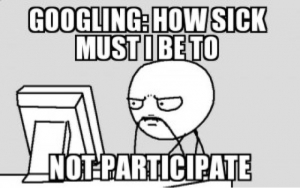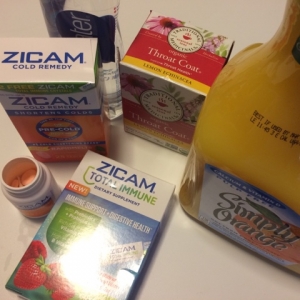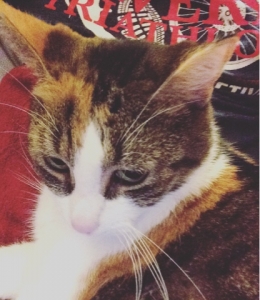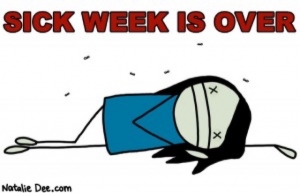Your training is awesome. You feel stronger than ever. Pushing new paces, meeting milestone mileage and keeping up with your hard training group are the norms for you. This could finally be your big year and you’re secretly convinced you might just be invincible.
Then, one terrible day you wake up and something isn’t right. You are sick. A common side effect for a freshly under the weather athlete is the early onset mental blender of thoughts:
“This can’t be right! I just rode my bike 50 miles. I’m strong. There’s no way I’m sick!”
“I have so much to do! I can’t afford to miss sessions on my training plan! Ok, maybe I’ll just run 4 mile repeats instead of 5.”
“Rest? I’m tougher than this. Mind over matter. Time to HTFU and sweat it out! I just need coffee and toughness.”
“Why me? This is so unfair! I’m going to lose all of my fitness and I’ll never meet my goals!” Or “My mitochondria are all going to melt!”
This is followed by infantile whining, complaining and a miserable demeanor.
I’ve been there. I’ve learned the hard way. I’ve sabotaged a quick recovery many times by listening to those early onset thoughts. Here are the ways I cope:
Assess Symptoms:
I have in the distant past ignored symptoms and loaded up on cold meds and coffee only to worsen and prolong my illness. Now, I use a thermometer and an outside observer. It is difficult to trust myself in the first stage of being under the weather. I take my temperature and ask the hubs for his thoughts. Here are conventional wisdom rules I follow:
- If your symptoms are below the neck do not train.
- If you are sneezing with a stuffy nose or a mild headache proceed with caution and reduced intensity.
- If you have a fever, even a mild one do not train. You don’t want to raise your temperature and further strain a body that is already working in overdrive to return you to a balanced state.
Forgive
It’s easy to become frustrated and feel like a moron when stuck in quarantine alone on the couch. On a work trip last week I fell into business travel style debauchery with very poor nutrition habits. This was coupled with my failure to take basic travel precautions like carrying a bottle of purell for the flight. I didn’t take zicam yet I knew I’d be exposed to so many travel germs. I got caught a bug. Beating myself up over these errors and feeling like an idiot or a sissy isn’t productive. I quiet the inner critic and forgive myself so I can focus on resting. I am an athlete and athletes are human. We all get sick sometimes.
Accept that Fitness Cannot be Built on a Sick Body:
If all symptoms are above the neck and I’m able to function in my normal life routine I might take cold meds and train. This is typically done with reduced intensity. The purpose of such workouts is to maintain muscle memory and keep my spirits up. I remind myself that one cannot build fitness on a sick body. I rest. My body needs its energy resources to knock out the illness as quickly as possible. The “ick” I caught after my work trip last week could have escalated into something more serious. Instead, I took three full days to sleep it off, a few more days of rest and then eased back in. I’m 100% healthy seven days later. Training stress to the system often prolongs recovery and could push a mild illness to something severe. I rest a lot and hope my dreams are full of fun cycling adventures. My recovery adviser and expert competitive napper keeps me company.
As a goal driven, type A high achiever with a cardio addiction it’s frustrating to take time off from training. Those who pacify, “You aren’t losing fitness!” are incorrect. Being forced to rest is in fact a setback. Multiple days off to regain health is a lost opportunity to gain fitness. For every day off from training there is a small fitness decline. It’s also true that the “hay is in the barn” and “all” my fitness is not completely disappearing. It is important not to be discouraged by disruptions rather to seek to minimize the time away through smart choices. Training is not about perfection. It’s about overcoming the setbacks and I work…err..rest really hard to come back as fast as possible and to be stronger on the other side of illness. This year I was in the middle of an exciting bike focus. I hit a 20 minute power PR right before Christmas. I was executing workouts perfectly. The travel bug disruption put that progress on hold but I knew if was smart it wouldn’t be long before I’d be back to crushing it on the bike.
Create Sick Day Goals:
I love the day to day process of following my plan. Its hard to have nothing to strive for when I’m sick. In these times I revise my short term goals from things like hitting target wattage and completing every session to goals around becoming healthy. Sleeping well at night is the number one goal. I might seek to drink a certain number of glasses of water in the next 3 hours. I’ll make myself set a doctor appt if needed. I’ll aim to get my dose of vitamin C. I hold hope every day that the next day will be the day I’m ready to ease back in.
Become a Smarter or Inspired Athlete:
I remember that a break from training is an opportunity to relax and become more educated. I’m a student of the sport who loves to learn so when I’m stuck at home I expand my knowledge. Blog posts, studies, articles, books and podcasts about sports fill the down time. I also look for inspiring athlete success stories. I review my old training blog posts, race reports and training logs to learn more about my training patterns. I might visualize my upcoming races. When I’m healthy again I have a broader knowledge base, cool new ideas to try and more mental fuel for training. If you’re looking for some cool resources let me know and I’m happy to share ideas.
Ease Back Intelligently
I know I need to listen to my body and make good decisions. Hitting it too hard when I’m not quite ready has long ago sent me straight back to more days of Dayquil, naps and OJ. I assess where I left off in training, how long I was out and how I feel each day. I adjust my schedule accordingly. I might ask a mentor for a second opinion on my plan for a valuable outside perspective. If I’m being coached in a one on one service I communicate this information to the coach. My advice here is that if you are working with a coach you need to tell the person exactly what action you took (or didn’t) and how your body is responding. This is important especially when there are changes. Verify that the coach is taking this feedback into consideration with your return to training plan. Give your coach the information so she or he can help you. If something seems “off” speak up to make sure the decisions are right for your health. This is a critical time for you and you are the only one who knows at every moment how your body is responding. You have the power to control how you react to changes so be good to yourself.
I enjoy the health once it returns and each healthy step is full of a gratitude that propels me to post sickness higher levels of fitness. I also try to learn from my setbacks and take on healthier habits to avoid the icky ordeal in the future.
That is how I have learned to cope with the common cold, food poisoning, the flu and other icky setbacks. I’m always interested in any other tricks or tips!




